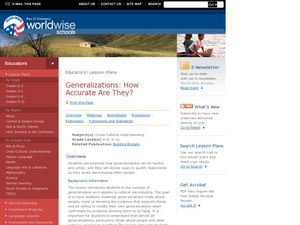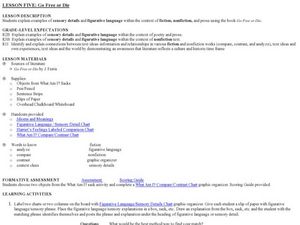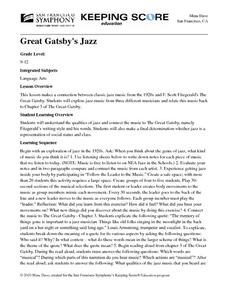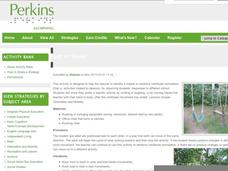Curated OER
Stonewall and Beyond: Gay and Lesbian Issues
Help learners understand their own biases and how their perspectives may have been influenced by biased media sources. They keep a journal while viewing videos, exploring websites, and engaging in class discussions related to gay and...
Curated OER
Lesson: Urs Fischer: Reviving the Past Art Movements
Seven major abstract art movements are analyzed by learners in groups. Each group analyzes various works by determining which work belongs to which movement. They then read Flatland, engage in an art and literary analysis discussion,...
Curated OER
Generalizations: How Accurate Are they?
Work together to evaluate the accuracy of generalizations. Examine the effects of cultural stereotyping based on generalizations. Students will engage in a class discussion aimed at answering the question, "What are some ways we can...
Curated OER
Go Free or Die: Figurative Language
Figures of speech, sensory details, and academic language are all targeted while reading Chapter Two of J. Ferris’ Go Free or Die. First, learners engage in an exercise to practice describing with detail. Then, partners use a...
Curated OER
Final Regents Review: The Middle Ages
A thorough and engaging look at the Medieval time period in Europe, this presentation includes photographs of guild crests, illuminated manuscripts, and historical documents. When coupled with a class discussion on Charlemagne and the...
Curated OER
Fun With Sorting and Classifying
Using a variety of activities, kindergartners explore sorting and classification. Learners engage in an online sorting activity, read books involving classification, and create their own class book. This is a marvelousway to explore this...
Curated OER
What Is Your Favorite Place?
Good writing can come from personal places. Budding online authors read an excerpt from a narrative-style newspaper article and then respond to several related writing prompts. They compose blog responses that use vivid imagery to...
Curated OER
What Makes a Novel a Novel?
They always say to write what you know. This approach is used to get middle schoolers prepared to write novels of their own. Using a favorite book as a model, potential novelists respond to prompts that ask about characters, plot, main...
Curated OER
Introduce Vocabulary: Owen and Mzee: The True Story of a Remarkable Friendship (Hatkoff & Kahumbu)
The heartfelt true story of Owen the hippopotamus and Mzee the 133-year-old tortoise will have budding readers engaged as they practice vocabulary in the context of Isabella Hatkoff's nonfiction story. Although you could include more,...
Alabama Learning Exchange
Mirror, Mirror on the Wall: Reflections of Light
Why can we see our reflection in a window but not a brick wall? Young physicists learn the Law of Reflection and various light properties that help them answer this and other questions about reflection. Use the PowerPoint to introduce...
Curated OER
The Adventures of Huckleberry Finn: Socratic Seminar
After reading The Adventures of Huckleberry Finn and an article about the use of the novel, class members engage in a Socratic seminar focused on whether or not Twain's book should be banned.
National Endowment for the Humanities
Revolution '67, Lesson 1: Protest: Why and How
To some people, protesting is as American as apple pie, but the factors that lead to protests can be as confusing to veteran activists as to today's youth. Revolution '67 explores the riots in Newark, New Jersey as a case study. ...
Physics Classroom
Action-Reaction Lab
Computer-interfaced motion detectors are required to carry out this inquiry. It is a new twist on exploring motion with plunger carts: they are set back-to-back and then propelled away from each other. Their velocities are measured, and...
Acoustical Society of America
Musical Instruments
Mix it up and engage learners in a lesson on music and physical science. Using cups, strings, guitars, and voice, the class will experiment with sound vibration and frequency. They'll use each instrument and fill out a worksheet that...
Curated OER
Great Gatsby's Jazz
As Nick wanders the grounds of Gatsby's mansion, he observes the behaviors of the rowdy guests and listens to the music pouring over the lawn. Bring the music of the jazz age into the classroom with Louis Armstrong's "West End Blues,"...
Illustrative Mathematics
Dilating a Line
High School geometers verify through experimentation certain properties about dilations. This multi-step problem challenges them to construct examples of dilations to verify specific facts, the final step provides an opportunity to more...
Clever Student Training Company
Eliminating Weak Essay Material
A strong essay eliminates weak or unnecessary material. Determining what information contributes to an essay and what information should be deleted is a skill readers and writers of informational text must develop. Class members practice...
Perkins School for the Blind
Circle Time
Oftentimes children or teens with one or more disability are reluctant to participate in whole-group activities. Foster good participation, verbal expression, and social skills through daily circle time activities. Each day you and...
Perkins School for the Blind
Planning a Special Event
I love planning parties, they are a great way to get social, require organizational skills, and engage cooperative problem solving. Teens with visual impairments put their heads together to plan an event for their friends. They...
Illustrative Mathematics
Counting Overview
Develop automatic, meaningful counting skills with your class by using everyday classroom/school items, objects, and opportunities. Counting skills should be practiced during the year using objects and items they are familiar with and...
Perkins School for the Blind
Balance Stations
Children with visual impairments need to continuously work on balance, gross motor skills, and mobility. Foster mobility and orientation skills by engaging them in a series of fun balance stations during PE. You'll set up each...
Curated OER
Fast or Slow?
Vestibular stimulation is an action or activity relating to balance and motion. To find out what kind of vestibular stimulation your learners with multiple disabilities enjoy best, follow these simple suggestions. You engage the child in...
Baylor College
Need or Want?
Even as adults it can be hard to distinguish needs from wants. Using pictures of common, everyday items, children make a pocket chart separating the objects they need from those that they want. Discuss their choices, explaining that...
Perkins School for the Blind
Following Directions
Turn the act of following directions into a fun and engaging game! Especially designed for students with cognitive or intellectual disabilities, this lesson uses a game format as a natural reinforcer. Write a set of directions onto a set...

























